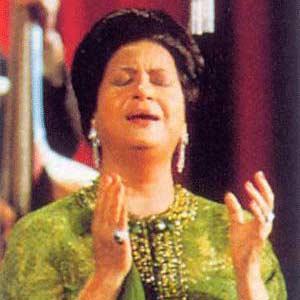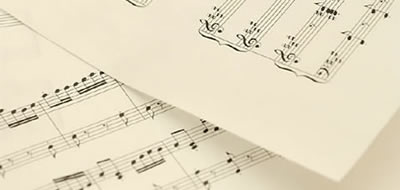Um Kulthoum's Life
|
|
|
|
|
|
|
|
| ِAudio Music & Singers | Video Music & Singers | Um Kalthoum's Audio Music | Um Kalthoum's Video Music |
|
|
Um Kulthoum
Born
Um Kulthoum Ibrahim Elbeltagi Umm ulthoum (Arabic: أم كلثوم, born أم كلثوم إبراهيم البلتاجي Um Kulthoum Ebrahim Elbeltagi; see Kunya; Egyptian Arabic: Om Kalsoum). (May 4, 1904 – February 3, 1975). Various spellings include Om Kalthoum, Oum Kalsoum, and Umm Kolthoum. In Turkish, she is named Ümmü Gülsüm. She was an Egyptian singer, songwriter, and actress. Born in El Senbellawein, she is known as "the Star of the East" (kawkab el-sharq). More than three decades after her death, she is still recognized as the Arab world's most famous and distinguished singer of the 20th century.[1] Kulthum had a contralto singing range. [2] Biography Early life Umm Kulthum was born in Tamay ez-Zahayra village in El Senbellawein, Dakahlia Governorate, Egypt. Her birth date is extremely controversial, and even the Egyptian Ministry of Information seems to have given either December 31, 1898 [1], or December 31, 1904 [2]. At a young age, she showed exceptional singing talent. Her father, an Imam, taught her to recite the Qur'an, and she is said to have memorized the entire book. When she was 12 years old, her father disguised her as a young boy and entered her in a small performing troupe that he directed. At the age of 16 she was noticed by Abol Ela Mohamed, a modestly famous singer, and by the famous oudist Zakariyya Ahmad, who invited her to Cairo. She waited until 1923 before accepting the invitation. She was invited on several occasions to the house of Amin Beh Al Mahdy, who taught her how to play the Oud". She developed a very close relationship to Rawyeha Al Mahdi, daughter of Amin, and became her closest friend. Kulthum even attended Rawheya's daughter's wedding, although she has always tried to avoid public appearances. Amin Al Mahdi introduced her to the cultural circles in Cairo. In Cairo, she carefully avoided succumbing to the attractions of the bohemian lifestyle, and indeed throughout her life stressed her pride in her humble origins and espousal of conservative values. She also maintained a tightly managed public image, which undoubtedly added to her allure. At this point in her career, she was introduced to the famous poet Ahmad Rami, who wrote 137 songs for her. Rami also introduced her to French literature, which he greatly admired from his studies at the Sorbonne, Paris, and eventually became her head mentor in Arabic literature and literary analysis. Furthermore, she was introduced to the renowned lute virtuoso and composer Mohamed El Qasabgi. El Qasabgi introduced Umm Kulthum to the Arabic Theatre Palace, where she would experience her first real public success. In 1932, her fame increased to the point where she embarked upon a large tour of the Middle East, touring such cities as Damascus, Baghdad, Beirut, and Tripoli, Lebanon. Fame By 1948 her fame had come to the attention of Gamal Abdel Nasser, who would later become the president of Egypt. At one point the Egyptian musicians guild of which she became a member (and eventually president) rejected her because she had sung for the then-deposed king, Farouk of Egypt. Nasser did not hide his admiration for her. When he discovered that she was no longer allowed to sing, he reportedly said something to the effect of "What are they? Crazy? Do you want Egypt to turn against us?"[3] It was his favor that made the musicians' guild accept her back into the fold. In addition, Umm Kulthum was a dedicated Egyptian patriot since the time of King Farouk. Some claim that Umm Kulthum's popularity helped Nasser’s political agenda. For example, Nasser’s speeches and other government messages were frequently broadcast immediately after Umm Kulthum's monthly radio concerts. Umm Kulthum was also known for her continuous contributions to charity works for the Egyptian military efforts. Umm Kulthum’s monthly concerts took place on the first Thursday of every month and were renowned for their ability to clear the streets of some of the world's most populous cities as people rushed home to tune in. Her songs deal mostly with the universal themes of love, longing and loss. They are nothing short of epic in scale, with durations measured in hours rather than minutes. A typical Umm Kulthum concert consisted of the performance of two or three songs over a period of three to six hours. In the late 1960s, due to her age, she began to shorten her performances to two songs over a period of two and a half to three hours. These performances are in some ways reminiscent of the structure of Western opera, consisting of long vocal passages linked by shorter orchestral interludes. However, Umm Kulthum was not stylistically influenced by opera. The duration of Umm Kulthum's songs in performance was not fixed, but varied based on the level of emotive interaction between the singer and her audience. A typical improvisatory technique of hers was to repeat a single phrase or sentence of a song's lyrics over and over, subtly altering the emotive emphasis and intensity each time to bring her audiences into a euphoric and ecstatic state, and was considered to "have never sang a line the same way twice". Thus, while the official recorded length of a song such as Enta Omri (You Are My Life) is approximately 60 minutes, a live performance could extend to many hours as the singer and her audience fed off each other's emotional energy. This intense, highly personalized creative relationship was undoubtedly one of the reasons for Umm Kulthum's tremendous success as an artist. Acting In parallel to her singing career, Umm Kulthum at one point pursued an acting career starring in six films; however, she quickly gave it up because of the lack of personal and emotional contact with the audience. Personal life Umm Kulthum was rumored to have had a romantic affair with Sharif Sabri Pasha, one of the uncles of King Farouk in the 1940s. By the mid-1950s, public speculation regarding Umm Kalthum's sexuality focused on her alleged love affairs and courtship of other women. In 1955, in what was perceived as a possible attempt to quash rumors surrounding her personal life, she hastily married a dermatologist named Hassen El Hafnaoui, taking care to include a clause in the marriage contract that would allow her to initiate a divorce if necessary. The couple had no children. Death In 1967, Umm Kulthum was diagnosed with a severe case of nephritis. She gave her last concert at the Palace of the Nile in 1973. Tests at that time indicated that her illness was incurable. She moved to the United States, where she benefited for some time from the advanced medical technology, but in 1975, upon re-entering her home country, she required hospitalization due to declining health. Umm Kulthum died in a Cairo hospital on February 3, 1975. Her funeral was attended by over 4 million mourners – one of the largest gatherings in history – and descended into pandemonium when the crowd seized control of her coffin and carried it to a mosque that they considered her favorite, before later releasing the coffin for burial. Legacy Umm Kulthum has been a significant influence on a number of musicians, both in the Arab World and beyond. Among others, Jah Wobble has claimed her as a significant influence on his work. Bob Dylan has been quoted as saying "She's great. She really is. Really great" [4][5], Maria Callas, Jean-Paul Sartre, Marie Laforêt, Salvador Dalí, Nico, Bono and Led Zeppelin are also known to be admirers of Kulthum's music. One of her best known songs, Enta Omri, has been the basis of many reinterpretations, including one 2005 collaborative project involving Israeli and Egyptian artists. She had been referred to as "The Lady" by Charles de Gaulle, and is regarded as "The Incomparable Voice" by Maria Callas, Umm Kulthum is remembered in Egypt and the Middle East as one of the greatest singers and musicians who have ever lived. It is hard to accurately measure her vocal range at its peak, since most of her songs are recorded live, and she was careful not to strain her voice too much due to the extended rendition of her songs. Even today, she has retained a near mythical status amongst young Egyptians. She is also notably popular in Israel among Jews and Arabs alike, and her records continue to sell around a million copies a year. In 2001, the Egyptian government opened the Kawkab al-Sharq (Planet of the East) Museum in the singer's memory. Housed in a pavilion on the grounds of Cairo's Manesterly Palace, the collection includes a range of Umm Kulthum's personal possessions, including her trademark sunglasses and scarves, along with photographs, recordings, and other archival material.[6] Her voice It is known that she had the ability to sing as low as the second octave, as well as the ability to sing as high as between the seventh and the eighth octave at her vocal peak; yet she also could easily sing over a range surpassing two octaves near the end of her career. Her remarkable ability to produce approximately 14,000 vibrations per second with her vocal chords, her unparalleled vocal strength (no commercial microphone utilized for singing could withstand its strength, forcing her to stand at a 1-3 meter radius away from one), her ability and capability to sing every single Arabic scale, and her voice’s unique and breathtaking beauty that surpasses convention, arguably makes her the most incomparable voice of all time. In her final few years, recordings show a slight coarsening of her voice, a loss of the silken golden thread of coloratura which in her earlier years, in songs such as Bairam al-Tunsi's Beredaak, she displayed with an ease and stupendous nonchalance. In a parallel to Piaf's recording of le Droit d'Aimer, Umm Kulthum's last recording, Hakam 'aleina il hawa, does in fact show that her vocal powers had deteriorated during her last illness, and it makes sometimes painful listening. Selected discography
•
Amal Hayati – Sono ("Hope of My Life") Citations 4. Danielson, Virginia. The Voice of Egypt: Umm Kulthum, Arabic Song, and Egyptian Society in the Twentieth Century. Chicago: University of Chicago Press, 1997. 1. ^ Umm Kulthoum - profile by the Egypt State Information Service 2. ^ Funeral for a Nightingale 3. ^ Umm Kulthum: A Voice Like Egypt. Dir. Michal Goldman. Narr. Omar Sharif. 1996. VHS. Arab Film Distribution, 1996. 4. ^ Playboy Interview: Bob Dylan 5. ^ Bob Dylan's Unswerving Road Back to Newport 6. ^ Rakha, Youssef and El-Aref, Nevine, "Umm Kulthoum, superstar", Al-Ahram Weekly, December 27, 2001 - January 2, 2002.
|


